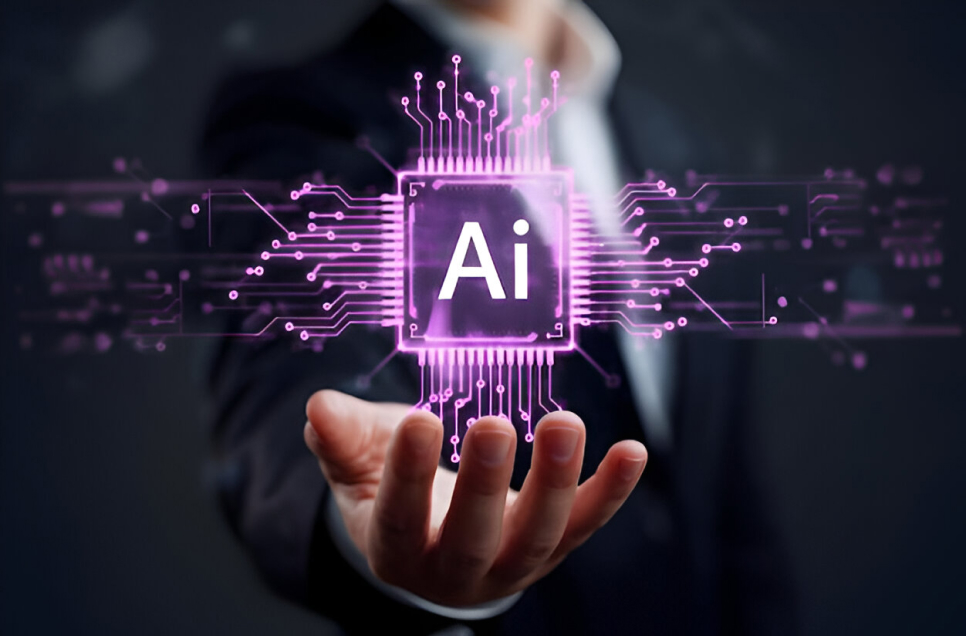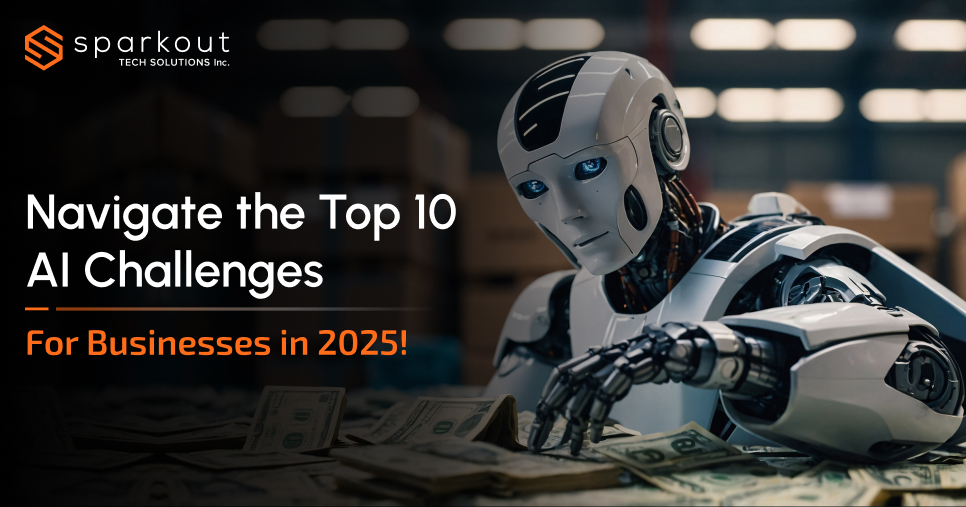By 2025, AI, once a hype, will fully have become a common technology that transforms innovation and brings efficiency to almost all organizations. However, that stampede is going to double the growing obstacles that pose tremendous risks. This lack of preparation highlights the urgent need to address these AI challenges in businesses to ensure successful implementation. AI challenges for businesses are not only technical but touch practically every aspect of operations starting from data security to modifications of the workforce. Issues such as integration of AI with the legacy system, data privacy, and addressing ethical concerns have become very common ones. Added to this list are scalability along with performance and the issue of reliability, and sustainability for AI.
Other issues that create more complexity in the mix include generative AI, high development costs, and environmental impact. Such AI challenges in businesses require the need for businesses to team up with seasoned AI development companies. This article gives the Top 10 AI Challenges for Businesses in 2025 as a how-to guide for organizations to help overcome roadblocks and realize the full potential of AI in 2025.
Key AI Challenges for Businesses in 2025
The more businesses move towards the utilization of AI this year 2025, AI challenges for businesses shall be more directly related to achievement. Companies that have the competency to surpass difficulties in integrating them or the arising ethical concerns when using AI therefore fully utilize this technology. Partnering with an AI agent development company and managing AI development costs is necessary for overcoming such challenges and a seamless transition. Other AI development issues that might crop up are algorithm bias, data security, and reliability of the system. Businesses can take advantage of efficiency-driven AI agents by avoiding risks by choosing experienced AI development companies.
1. Ethics of AI
There are many AI challenges before businesses, and the ethics of AI systems is where businesses really struggle. Bias in algorithms, lack of transparency, and no clear framework for ethical decision-making present the biggest hurdles. To build AI agents that are fair, accountable, and operate within ethical boundaries will be fundamental for achieving more universal acceptance of AI.

Businesses can work with a trusted AI agent development company by engaging experts to develop systems that give much importance to the concepts of fairness and transparency. Handling these ethical issues at the front end of development can avoid downstream issues such as discrimination and a failure to adhere to standards in the law. These efforts should instead foster a basis for trust between customers and stakeholders; thus, it is basic to AI developments for companies to avoid development issues possibly generated from such unethical AI practices.
2. AI Integration
Integrating AI into existing systems is one of the biggest AI challenges for businesses. Legacy infrastructures often can’t support modern AI solutions, causing inefficiencies and compatibility problems. This makes it difficult for businesses to use AI for automation, analytics, and better customer experiences.

The answer is to work with experienced AI development companies that specialize in smooth AI integration. These experts know how to handle AI development costs while ensuring the system works well with existing workflows. Whether it’s migrating to the cloud, connecting different systems, or upgrading old software, choosing the right partners is essential.
By overcoming AI integration challenges, businesses can boost productivity, reduce operational costs, and use AI more effectively across different functions.
3. Data Privacy and Security
Data privacy and security are of great concern once businesses become dependent on AI. This sensitive data used by the AI system needs protection against access, breaches, and misuse from sources that are not authorized. One of the major AI challenges for businesses needs is data security, which can be implemented with data encryption, data anonymization, and regulation measures such as GDPR compliance.

Team up with AI development companies to ensure that set data protection standards are met. These companies develop secure AI systems that are designed to respect privacy.
As more businesses start using AI, the demand for proper data security in AI product development will rise. It has to fight against the risks and not lose its customer's confidence. Failure may lead to the development problem and damage the reputation of the company and, eventually, cause some legal problems as well. Investment in secure systems is a must to protect the AI-generated data.
4. Leveraging AI for Compliance and Reporting
AI eased the tasks involved in doing compliance and reporting. One of the biggest headaches with which business establishments are dealing is the issue of retaining the AI systems that enable them to cope with the emerging regulatory environment. The challenges that AI poses to business is in the designing of flexible systems that would adapt easily to the new laws and guidelines. Business enterprises should, therefore, focus on developing AI solutions that change with the regulation; such systems must automate compliance tasks and offer real-time reporting insights.

A company can partner with an AI agent development company to design AI systems that automate and streamline reporting processes, reduce labor, and enhance productivity while still being compliant with complex regulations.
To avoid the risks of non-compliance, organizations should ensure that compliance is considered at the outset of the AI development team. Long-term success requires compliance to be included in the design phase from the very beginning.
5. Balancing Scalability and Speed
Another challenge that companies adopting AI must face is attaining the ideal balance between scaling and speed. As an organization grows, its systems of AI must scale up with increasing demands and remain optimal. This leaves business with exclusive sets of challenges that demand only sophisticated infrastructure, along with some expert AI developers. In doing this, work will be guaranteed with a company that will build AI agents. The end product will be both scalable and fast, avoiding the usual trade-off between speed and performance.

Scalable systems will become highly important as businesses extend their AI capabilities. Such systems need to handle huge loads of data, complex operations, and high response times, but in such a way that the AI development cost is efficient and stable.
6. Ensuring the Safety and Reliability of AI Systems
Generative AI tools can produce content, designs, and other outputs. Although these are exciting opportunities for businesses, they pose challenges, including copyright issues, data misuse, and the possibility of producing low-quality outputs. Integration is one of the AI Challenges for businesses that include effectively incorporating the tools into the workplace while managing the potential risks. The solutions entail developing strategic policies by businesses to effectively utilize generative AI responsibly. This implies that one is to follow requirements such as adherence to copyright and data usage to ensure quality and avoid intellectual property-related issues.

As a result of the generative AI tool safe implementation by a well-established AI agent development company, businesses can have effective deployment for monitoring misuse settings. Proper integration of generative AI tools enables productivity gains in addition to managing risks on account of quality issues and intellectual property violations.
7. Generative AI in the Workplace
Generative AI tools can produce content, designs, and other outputs. Although these are exciting opportunities for businesses, they pose challenges, including copyright issues, data misuse, and the possibility of producing low-quality outputs. Challenges in the integration of AI for businesses include effectively incorporating the tools into the workplace while managing the potential risks. The solutions entail developing strategic policies by businesses to effectively utilize generative AI responsibly. This implies that one is to follow requirements such as adherence to copyright and data usage to ensure quality and avoid intellectual property-related issues.

As a result of the generative AI tool safe implementation by a well-established AI agent development company, businesses can have effective deployment for monitoring misuse settings. Proper integration of generative AI tools enables productivity gains in addition to managing risks on account of quality issues and intellectual property violations.
8. Data Quality and Availability

The effectiveness of AI systems is determined by the quality and availability of data used. The majority of the AI challenges in businesses stem from poor data, either incomplete, inconsistent, or biased. This makes the predictions wrong and decisions accordingly. To this end, a business should spend on processes such as data cleaning and organizing to ensure their AI systems work with reliable data. At the same time, they must work on efficiently storing and managing data infrastructure. An AI development company can cooperate with businesses for setting up good data pipelines and systems that control various sources of data. Good quality data forms the base for success in AI, and hence improving this element ensures better decision-making and outcomes.
9. High Carbon Footprint

AI systems, especially the very powerful models and large datasets, use tons of energy and have a high carbon footprint. Sustainability has become an issue for businesses, and this is one of the key AI challenges for businesses today: the environmental impact. Companies can adopt energy-efficient algorithms, optimize computing resources, and embrace green technologies to reduce their carbon impact. Companies that specialize in green solutions can assist in finding the right balance with partner companies in AI development. In addition to contributing to a greener environment, sustainable AI development is in step with the world's thrust toward green technology, thus giving businesses an edge in competition.
10. Workforce Disruption
With the role that AI is playing in business operations, concern about job loss and disruption in the workforce is raised automatically. Even though AI can lead to automation of repetitive tasks and ensure a minimization of errors, the same may lead to a mismatch of skills and perhaps job displacement. Business will be at the helm of such a situation where they integrate AI for the good of both their operations and employees. That could be achieved through upskilling and reskilling the workforce to work hand in hand with the AI system. This could also be built by collaboration with an AI agent development company building systems that would augment human capacity rather than replace. In doing so, designing AI solutions in support of the worker can serve to ensure this transition is smoothened and create space where humans work alongside AI systems towards common ends.

Businesses will need to be proactive in the face of AI challenges for businesses as AI transforms industries in 2025. From ensuring quality data and reducing environmental impacts to managing changes in the workforce, thoughtful approaches are crucial. Businesses can tap into the full potential of AI while minimizing risks and achieving long-term success by working with the right AI development companies and focusing on ethical, scalable, and sustainable solutions.
Tackling AI Challenges in Businesses
In order to address AI challenges in businesses, the strategic plan will require more teamwork and innovativeness. This is the key to being more proactive to successfully overcome business operation transformation obstacles created by this influential technology. These are some strategies by which business people should tackle the challenges of AI as follows.
1. Collaborate with Experts
One of the most effective strategies toward overcoming AI challenges in businesses is to partner with experienced AI development companies. Such firms can design scalable, ethical, and efficient AI systems that are integrated seamlessly into existing infrastructure. Within such an environment, businesses may reduce risks while maximizing performance.
2. Data Quality
All this begins with data curation, cleaning, and investments in infrastructure when training AI systems on reliable, relevant data. The business would then need powerful data governance policies that ensure the integrity and security of data.
3. Building Ethical and Transparent AI
Develop the AI system in a manner that is both fair and accountable and with utmost transparency. Companies could have standards with which they develop diversity as it can help in reduced bias and then, consequently, stakeholder trust.
4. Focus on Workforce Upskilling
AI will augment, not replace the capabilities of humans. The need is to invest in the upskilling and reskilling of the workforce to operate in tandem with these systems. Optimal dislocation can only be minimized in the business world if there is an environment that fosters collaboration. This would help empower employees to thrive in an AI-driven world.
5. Optimize for Sustainability
Sometimes, business will have no other choice but to stop ignoring the ecological footprint of AI. Businesses will use algorithms that save energy and look into green technologies, and design an AI system as green as possible by adding value towards environmental wellbeing as they monitor the current global agendas while keeping greening in business practices under the tight regulation of regulatory bodies.
6. Maintain Compliance with Regulations
It is crucial to navigate the ever-changing regulatory landscape. Organizations need to design flexible AI systems that respond to changing laws and automate the compliance process. Proactive compliance challenges will ensure smooth operation and reduce the legal risks associated with it.
7. Integrate AI Seamlessly
Legacy systems generally form bottlenecks in embracing AI. However, the integration challenges come with answers as well. Companies can design new infrastructures, subscribe to cloud solutions, or refresh old workflows to be a remedy. Proper planning in integration would ensure maximum efficiency and compatibility.
By solving and addressing all of these issues, businesses will be able to reap all the advantages of AI for the future in the subsequent phases of 2025. When firms are associated with other companies which specialize in developing aspects of AI and conduct sustainable and ethical operations and activities, so do the organizations have innovation and progress.
How Sparkout Tech Solutions Tackles AI Challenges for Businesses
At Sparkout Tech Solutions, we understand what companies are struggling with as they move towards AI. Be it ethical issues, data security problems, the problem of integration, or disruption of the workforce, we assist businesses through all the various aspects of their AI journey. Our bespoke AI solutions cater to the unique challenges of your business. Data quality and privacy remain a priority throughout the life cycle. This ensures that business needs are delivered combined with international standards. Our designs are scalable and sustainable systems, which make it possible for business needs to be delivered around the world.
We implement robust frameworks such as data encryption to ensure confidentiality and safeguard sensitive information. The primary mission at Sparkout is sustainable AI technologies. Our solutions enhance workforce efficiency while empowering human teams. This makes AI adoption smooth and easy for your organization. We are here to help you scale your operations, boost productivity, or meet your regulatory requirements. We make sure you beat AI challenges and unlock its full potential for long-term success.
